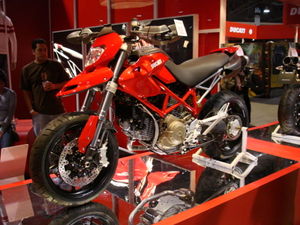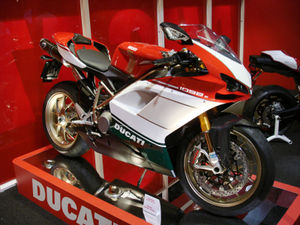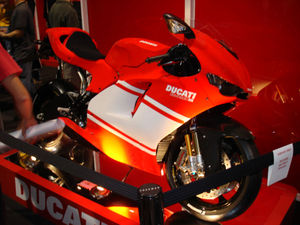Ducati
Ducati motorcycles have long been known for their excellence in design and performance. From the first post-war bicycle-like low-displacement motorbikes Ducati has grown over the years into a racing giant that is consistently competitive in both the racing arena and the world motorcycle marketplace.
In the 1960s, Ducati earned its place in motorcycling history by producing the fastest 250cc road bike available, the Mach 1.
In the 1970s Ducati began producing large-displacement L-twin motorcycles and in 1973 released a L-twin with the trademark desmodromic valve design. In 1985, Cagiva bought Ducati. In 1996, Texas Pacific Group bought 51% of the company for $325 million and renamed the company Ducati Motor SpA.
Ducati is best known for high performance motorcycles characterized by trellis-style frames and large capacity four-stroke, 90-degree L-twin engines featuring desmodromic valve design. Modern Ducatis remain among the dominant performance motorcycles available today despite the aging technology of Desmo engine, which is nearing its 50th year in production. (Desmodromic valves are those which are positively closed by a leverage system, rather than relying on the more conventional springs to close the valves).
While most other manufacturers have adopted wet-clutches (with the spinning parts bathed in oil) Ducati uses dry clutches in most of its motorcycles. This eliminates the power loss from oil viscosity drag on the engine even though the engagement may not be as smooth as the oiled versions.
Although the exorbitant cost of servicing the Ducati's finicky engine can shock some owners, most will still agree that the improved ride quality, performance, and styling of Ducatis is worth the extra cost.
Product history
The chief designer of Ducati motorcycles from the 1950s was the late Fabio Taglioni (1920-2001). He designed most Ducatis during this period, ranging from the small single cylinder machines that were successful in the Italian 'street races' up to the large capacity twins of the 80s. Ducati introduced the Pantah in 1979; its engine was updated in the 1990s in the Ducati SuperSport (SS) series. All modern Ducati engines are derivatives of the Pantah, which uses a toothed belt to actuate the engine's valves. Taglioni used the prancing horse (identified with the Ferrari brand) on his Ducati motorbikes, Taglioni chose this emblem of courage and daring as a sign of respect and admiration for Francesco Baracca, a heroic World War I fighter pilot that died during an air raid in 1918.
1950s
1960s
1970s
In 1973, Ducati also commemorated its 1972 win at the Imola 200 with the production model green frame Ducati 750 SuperSport.
(In 2006 the retro styled Ducati PaulSmart1000LE, which shares styling cues with the 1973 750 SuperSport (itself a production replica of Paul Smart's 1972 race winning 750 Imola Desmo) was released, as one of a SportClassic series representing the 750 GT, 750 Sport, and 750 SuperSport Ducati motorcycles.)
1980s
Ducati's liquid-cooled multi-valve V twins made from 1985 on are known as Quattrovalvole ("four-valve"). These include the 916 and 996, 999 and a few predecessors and derivatives.
1990s
In 1993, Miguel Angel Galuzzi introduced the Ducati Monster, a naked bike with exposed trellis and engine. Today the Monster accounts for almost half of the company's worldwide sales. The Monster, which has been out since 1994, has undergone the most changes of any motorcycle that Ducati has ever produced. After more than a decade of manufacturing, Ducati continues to create innovative changes to this classic motorcycle.
In 1995, the company introduced the Ducati 916 model designed by Massimo Tamburini, a water-cooled version that allowed for higher output levels and a striking new bodywork that featured aggressive lines, underseat exhausts, and a single-sided swingarm. Ducati has since ceased production of what many called the bike of the 1990s, supplanting it with the 749 and 999.
Current lineup
For the 2008 model year, Ducati lineup is as follows:
- 695
- 696
- S2R 1000
- S4R Testastretta
- S4R S Testastretta
- S4R S Testastretta Tri-Colore
- 1100
- 1100 S
- GT 1000
- Sport 1000 monoposto
- Sport 1000 biposto
- Sport 1000 S biposto
- ST3
- ST3 S ABS
- Other
- Motors used in 2006
- Desmodue: Desmo two valve air cooled, 40° included valve angle, (800SS, Multistrada 620, Monster 620 695 803 992)
- Desmodue Double Spark: Desmo two valve , air cooled, 40° included valve angle, (1000DS, Multistrada 1000DS)
- Desmotre Double Spark: Desmo three valve, liquid cooled, 40° included valve angle, (ST3)
- Desmoquattro Testastretta: Desmo four valve, liquid cooled, 25° included valve angle, (999, 749, Monster S4RS)
- Motors introduced for 2007+
- Testastretta Evoluzione: Desmo four valve, liquid cooled, 25° included valve angle, (848/1098)
Future
Ducati had completed testing the Desmosedici GP7, Ducati's 2007 MotoGP race bike. The GP7 complies with new regulations requiring a maximum of 800 cc (as compared with the 989 cc of the GP6). The GP7 is currently known to be the most powerful 800 cc MotoGP race bike, as illustrated in the 2007 Qatar GP, where the four Ducatis produced, by a considerable margin, the highest top speeds of the entire MotoGP grid.
Racing History
Racing History
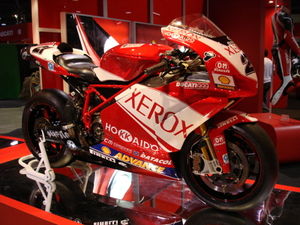
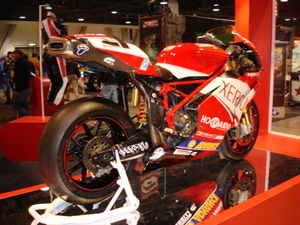
MotoGP
Ducati rejoined Grand Prix motorcycle racing in 2003, after a 30 year absence. Loris Capirossi has been with the team since its current inception in 2003 and Casey Stoner joined him as a teammate for the 2007 season riding the Desmosedici GP7. On September 23, 2007 Casey Stoner clinched his and Ducati's first Grand Prix World Championship.
When Ducati re-joined MotoGP in 2003, MotoGP had changed its rules to allow four-stroke 990cc engines to race. At the time Ducati was the fastest bike. In 2007, MotoGP reduced the engine size to 800cc, yet Ducati continued to be the fastest bike. Ducati continued that trend in 2007 with a bike that was markedly faster than its rivals as was displayed by Casey Stoner on tracks with long straights.
Ducati also supplies bikes to the Pramac d'Antín team, who are running the Desmosedici GP7.
For the 2008 MotoGP season, Ducati will campaign their Desmosedici GP8 with Casey Stoner and Marco Melandri. Capirossi will leave Ducati and ride with Suzuki in 2008.
| Year | Country | Champion | Bike |
|---|---|---|---|
| 2007 | Casey Stoner | Ducati GP7 |
World Superbike Rider Championships
Ducati currently campaigns their 999F07 in the series, which is a homologated racing version of the 999R. For the 2008 season, Ducati will race a homologated version of their current 1098. The reason for this is that currently, the FIM, the sanctioning body for the Superbike World Championship, limits the maximum displacement for a 2 cylinder motor (which is the type of engine Ducati uses in their 999 and 1098 bikes) to 1,000 cc. For 2008, the FIM has raised the displacement limit for a 2 cylinder motor to 1,200cc.
The company has enjoyed twelve Superbike World Championships since the series' inception in 1988.
| Year | Country | Champion | Bike |
|---|---|---|---|
| 1990 | Raymond Roche | Ducati 851 | |
| 1991 | Doug Polen | Ducati 888 | |
| 1992 | Doug Polen | Ducati 888 | |
| 1994 | Carl Fogarty | Ducati 916 | |
| 1995 | Carl Fogarty | Ducati 916 | |
| 1996 | Troy Corser | Ducati 916 | |
| 1998 | Carl Fogarty | Ducati 996 | |
| 1999 | Carl Fogarty | Ducati 996 | |
| 2001 | Troy Bayliss | Ducati 996 | |
| 2003 | Neil Hodgson | Ducati 999 | |
| 2004 | James Toseland | Ducati 999 | |
| 2006 | Troy Bayliss | Ducati 999 |
Ducati has also won thirteen WSBK Manufacturer Championships for years 1991–1996, 1998, 1999, 2001–2004, and 2006.
AMA Superbike
In the AMA Superbike series, Ducati has had its share of success, with Doug Polen winning the title in 1993 and Troy Corser the following year in 1994. Ducati has entered a bike in every AMA Superbike season since 1986, but withdrew from the series after the 2006 season.
British Superbike
The British Superbike series has been won by Ducati riders on seven occasions: 1995 Steve Hislop, Scotland; 1999 Troy Bayliss, Australia; 2000 Neil Hodgson, England; 2001 John Reynolds, England; 2002 Steve Hislop, Scotland; 2003 Shane Byrne, England; 2005 Gregorio Lavilla, Spain
See also
External links
Official Ducati links:
- Ducati main website The manufacturer's main website; current model info, including online information, history, manuals and race team info (Italian/English)
- Ducati North America website Ducati NA information for USA and Canada.
- Ducati Japan website Ducati NA information for Japan (Japanese).
Enthusiast and owner group sites:
- Ducati Multistrada List Ducati Multistrada pictures, discussion, technical assistance, owner feedback forums, ride stories, links, manuals, movies, marketplace, racing and more (English).
- Duc.nu Ducati pictures, manuals, movies, racing and more (Dutch/English).
- Ducati Webring Created in 1996 this webring is a collective of currently 132 active Ducati related websites.
- Ducati Monster List USA-based Monster Owners resource and community forum site
- The Ducati Owners Club GB The largest and oldest Ducati club worldwide, based in the UK.
- The Ducati Sporting Club Home of the UK's newest club for Ducati owners and enthusiasts.
- The Monster Owners Club UK-based club for Ducati Monster Owners
- UK Ducati Forum (Ducatisti.co.uk) Free forum for chat and technical help, pictures, videos, classifieds, meets, ride-outs and more!
- BevelHeaven - Classic Bevel Drive Ducati Forum Ducati Singles and Twins through until 1985.
- Ducati Meccanica Website Information, photos, and resources for all classic Ducati Bevel drive motorcycles (1954 to 1985).
- Ducati Owners site and home to the largest MH900e registry
- The Ducati Portal Ducati owners discussion site, all Ducati bikes.
- Ducatistas.com Spain's biggest Ducati fan club, free chat, forums, meetings, events, and more.
- 1996 900SS/SP Registry Dedicated registry for the 1996 900SS/SP.
- Ducati Dealers Online guide to the World's leading Ducati Dealers.
Ducati technical reference sites:
- Desmo Times This site includes DIY information and resources for Ducati Enthusiasts to be able to maintain their own Ducatis.
- Desmodromic Valve Gear What does desmo mean?
| Scrambler 250 | M620 Monster | 620 SPORT | 748 | 748S | 749 | 749/R/S | 750 Imola | 750 SS | 800 Sport | 800 SS | 848 | 851 | 888 Superbike | 900SS | 900GTS | 916 | 996 | 998 | 999 | 999/R/S | 1098 | 1198 | Apollo | Desmosedici | Hypermotard | Monster | Multistrada | Pantah | Paso | Sport 1000 Classic | 1000DS | PaulSmart1000LE | ST2 | ST3 | ST4 | ST4S | SuperSport | |
| Current motorcycles: | Multistrada (Multistrada 1200) · Desmosedici · Desmosedici RR · Monster 696 · Monster · SportClassic · 848 · 1098 · 1198 · Hypermotard · Streetfighter | |
|---|---|---|
| Previous motorcycles: | 60, 60S, 65S · 65T, 65TL, 65TS · 98, 98N, 98T, 98TL, 98S, 98SS · 125 S, SV · 125 Gran Sport Mariana · 125 Aurea · 98TS and 85, 98, 125 Bronco · Mach 1 · Apollo · 750 GT ·750 Imola · Supermono · 800SS · 851 · 888 · 900GTS · 748 · 749 · 916 · 996 · 998 · 999 · Pantah · Paso · PaulSmart1000LE · ST series (ST2 · ST3 · ST4) · SuperSport | |
| Ducati mopeds: | Cucciolo · 55 · Brisk · Falcon · Rolly | |
| Designers | Fabbro · Galluzzi · Taglioni · Tamburini · Terblanche | |
| Racing division: | Ducati Corse | |

